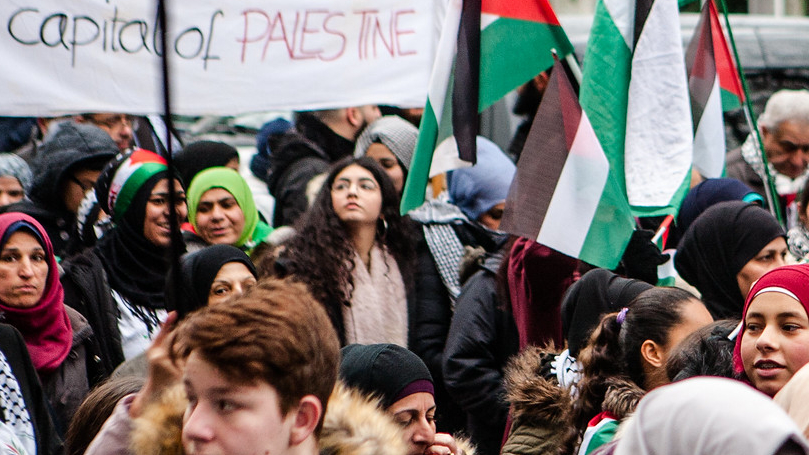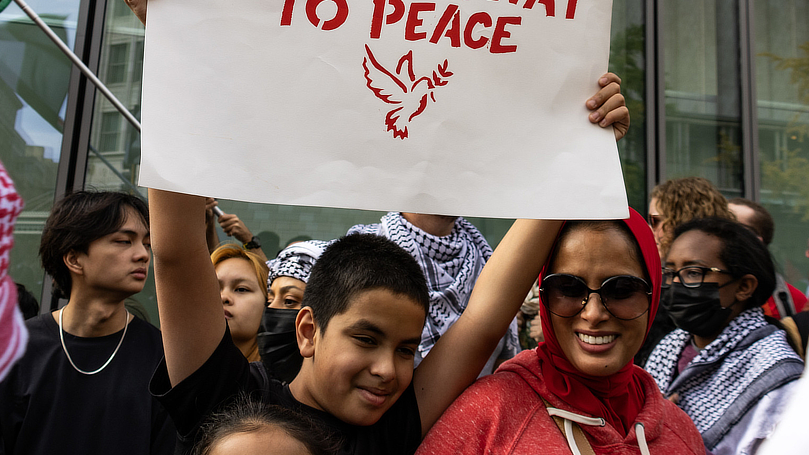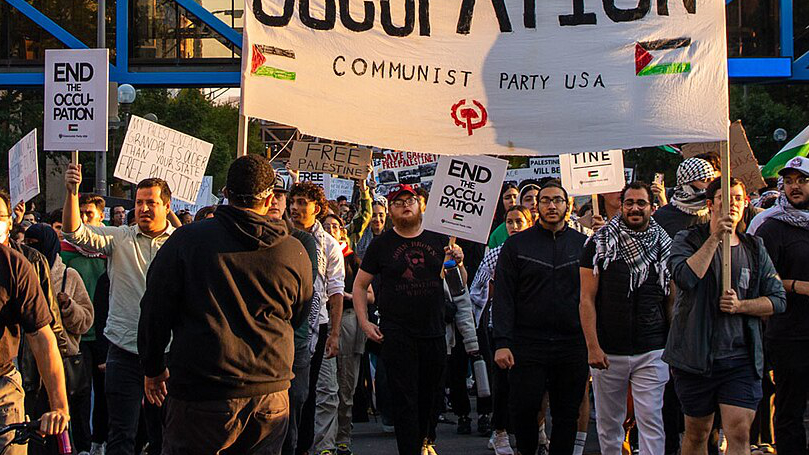
This piece is a contribution to the Pre-Convention Discussion for our 32nd National Convention. During Pre-Convention Discussion, all aspects of the party’s program, strategy, and tactics are up for consideration and debate. The ideas presented here are those of the author or authors alone, and do not necessarily reflect the positions of the Communist Party USA, its membership, or their elected leadership bodies. — Editors
A recent article, Our position on Palestine cannot be formed unilaterally, explains that the Party’s position on Palestinian self-determination is drawn from our fraternal parties. While this is certainly the case, there are gaps within the article which could be precarious in the current moment. In light of the ongoing genocide in Gaza, it is necessary for us as a Party to examine and elaborate on the development of our understanding of zionism and Palestinian self-determination. While our stances on international issues draw from the analyses of our fraternal parties, elevating and highlighting some key points in our own Party’s approach throughout its history can be instructive for us to meet the political moment.
Important to emphasize is that the Party has opposed zionism since before the Nakba in 1948. Before the establishment of Israel, this position was made evident in the The People’s Front, a book which, while controversial, can be looked at as a defining ideological text of the period of the late 1930s. In it, Earl Browder, then General Secretary of the CPUSA, made clear that the Party opposes zionism, arguing:
All Jewish workers who have been supporters, or have been influenced by, Zionism, and who have been hostile to the Communist Party because our Party opposed its political program, should really be prepared to do some hard and fundamental thinking about the latest British proposal for partition of Palestine, and to draw some serious lessons from the crisis in Zionism that it produced…
Is it not clear that the British imperialists deliberately prepared for this debacle of Zionism by setting Jews against the Arabs, and by creating conditions that make friendly cooperation between the two people more difficult…
Is it not clear that any program of a dispersed people, which looks to support of the British imperialists for realization inevitably becomes simply a tool in the hands of the imperialists?

Even prior, in 1935, the editors of New Masses in their preface to the article “Brown Shirts in Zion” by Robert Gessner, which highlights the fascist orientation of Zionist leaders like Vladimir Jabotinsky, argued that:
Zionism is a tool of British imperialism which needs Palestine for its own purposes; Zionism is dispossessing the Arab peasants and is conducting a colonization by conquest with the aid of British bayonets; No nation can solve its problems by emigrating to another country, even if Palestine were not so small and so thickly populated; Zionism draws away the attention of the Jewish masses from the problems of the countries where they live; Zionism separates them from the masses of other nationalities; as a chauvinist movement it is a breeding ground for fascism.
Beyond simply opposing zionism, the Party was clearly aware of the colonialist and fascist basis of its attitude toward Palestine over a decade before the Nakba happened. These are essential details in understanding the Party’s position from the beginning.
Equally imperative to emphasize is that the Party has also long understood zionism as a fundamentally racist project. In 1975, William L. Patterson, longtime leader of the Communist Party, wrote an article titled “Zionism’s Actions Prove Zionism’s Racism,” in the Daily World. In it he explains that “Racism is a doctrine, a philosophy of the world’s warmongers. It is a vicious incitement to genocidal tactics in all social relations.” Following from this he explains that the conclusion that zionism is racism “flows logically from the history of zionist relations with the Arab peoples of Palestine, the Oriental Jews and Black Jews.” In further illustrating his argument, he notes that zionism, itself, is antisemitic and that zionist support for Rhodesia and South Africa not only highlights that “the zionists’ treatment of the Palestinians is analogous in some respects to that of South Africa’s racist murder clique toward Blacks,” but that this support reveals the racism at zionism’s core. Additionally illustrative of zionism’s racism is its imperialist orientation, by which zionism “threatens the successful implementation of the African and Asian liberation movements, as well as world peace.”
This particular component is an important insight into our Party’s position on zionism. Our Party’s opposition to zionism as a racist, colonial, and expansionist project is imperative in expressing our support for the Palestinian right to self-determination. It is following from this position that we form our understanding of the Nakba as an ongoing, fundamentally violent, settler-colonial process, the responsibility of which lies with the Israeli occupation and zionism. We see this continued process of slaughter and mass displacement continuing through the unfolding genocide in Gaza and must work to combat Israel’s continued assaults on the Palestinian people. Zionism’s racism is also central to the question domestically, as we see a rise in the repression of Palestinians, Arabs, and Palestinian solidarity activists. We are experiencing a climate of increased anti-Palestinian, anti-Muslim, and anti-Arab propaganda pushed by zionist politicians and institutions. Understanding these points is indispensable in locating the root of the current violence against the Palestinian people.
Finally, the Party’s present position of supporting a two-state solution, as is developed from the position of the Palestinian People’s Party, also requires additional elaboration.

The CPUSA has long perceived the creation of two states as a tactical step to a more long-term solution for Palestinian liberation and the end of occupation and apartheid. Particularly relevant on this point is the work of Hyman Lumer, who in 1975 published “The Palestinian Question and the Middle East Conflict” in Political Affairs. In this piece he makes clear that “the establishment of a Palestinian Arab state in the West Bank and the Gaza strip is no more than a first step toward the solution of the problem of self-determination.” He elaborates:
Such a state, with its small, divided territory and meager economic resources, has serious problems of economic viability to cope with. Second, the establishment of such a state leaves unresolved the future of the rest of the Palestinian population–in the East Bank, in Lebanon, in Israel and elsewhere. And most important, it leaves the problem of refugees yet to be resolved on the basis of their right to return to their homes or receive compensation for their property. The process of self-determination would therefore have to continue beyond this initial step…
Following from this, the Party’s position was not that a two-state solution was a final end goal, but that it sought to support the change in the balance of forces that the establishment of two states could provide on the international arena. In doing so, the Party has hoped to see long-term de-zionization, as Hyman Lumer referred to it, leading to what Lumer outlined as a hopeful future based on ongoing negotiations and struggles: a “unified Palestinian state” as a binational state of “voluntary union” founded on the “equality of the two peoples.” While our Party, drawing from our fraternal organizations, recognizes the immediate demand for the establishing of a Palestinian state along ’67 borders, it also has had a more far-reaching view of Palestinian liberation: de-zionization, an end to occupation, an end to the ongoing Nakba, and a future unified, democratic state of Jews and Palestinians living in equality.
Thus, the Party’s position has not just been a cut and dry support for a two-state solution, but an understanding of the establishment of two states, with emphasis on the right of return and an end to the occupation, as a first step in pursuance of a longer, more just, and more sustainable resolution to the struggle for Palestinian freedom. Emphasizing these specific points is key in providing clarity and guiding us to action in this moment, to direct our work for a ceasefire, for ending U.S. aid to Israel, and for supporting Palestinian self-determination.
Images: Palestine solidarity protest, Berlin by Hossam el-Hamalawy (CC BY 2.0 Deed); We Can’t Bomb Our Way To Peace by Diane Krauthamer (CC BY-NC-SA 2.0 Deed); End the Occupation by Becker1999 from Columbus, OH via Wikimedia Commons (CC BY 2.0)


 Join Now
Join Now